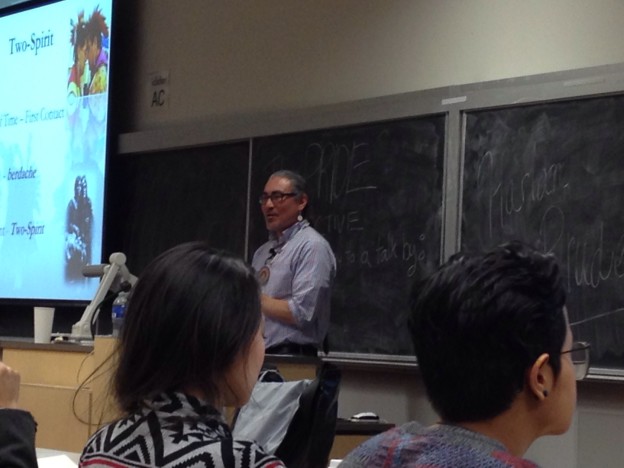On Thursday, January 8, 2015, the Pride Collective at UBC hosted a fantastic presentation in Irving K. Barber, located on the traditional territory of the xʷməθkʷəy̓əm (Musqueam) people. Harlan Pruden who is First Nations Cree, spoke to themes of sex, gender, sexuality, and the complexities of Two-Spirit identities within Indigenous contexts, both historical and contemporary. Settlers and Indigenous peoples alike were invited to learn about the ways in which Two-Spirit people challenge colonial norms of gender and sexuality, and Pruden showed the effects that settler-colonialism has had on the experiences and histories of these marginalized peoples. First established in 1990 at an academic conference, the term “Two-Spirit” works as an umbrella term to encompass the vast number of gender identities and sexual orientations that exist outside the heteronormative gender binary within Indigenous communities that have existed since time immemorial.
Pruden has worked on a number of initiatives, including a recent appointment to the Presidential Advisory Council on HIV/AIDS. Originally from the Cree Nation on this side of the border (Canada), Harlan now works in New York with the NorthEast Two-Spirit Society. Here Pruden facilitates workshops, pow-wow dancing, and other events for Indigenous peoples, all of which are specifically tailored to welcome Two-Spirit and LGBTQAI+ Indigenous identified individuals.
“It would do my heart so good [if] you left with more questions than you had…for you to start finding out and answering those questions for yourself and doing research and adding more and more knowledge,” Harlan said to the packed room, reminding the audience that this work is not just for Two-Spirit people, but the broader Native community and the dominant society as a whole. Through this communal work we have “to see if we can build upon the experiences of…Indigenous peoples’ knowledge, and to share that so we can make this a better place, ultimately working for social justice”.[1]
Harlan Pruden was also kind enough to share a working list of words that specific Indigenous communities use to identify Two-Spirit people. The importance of this list cannot be understated. With dozens upon dozens of words identifying Two-Spirit people in diverse communities tells the audience “where there is a word, there’s a history”. While Pruden acknowledged the imperfections of the working list, it was also pointed out that Indigenous people struggling with their identities might be looking for these words to help position themselves. By sharing these words Pruden is undoing the erasure of these identities that many Two-Spirit people have felt due to colonialism. By sharing this list, we are reminded, settlers and Indigenous peoples alike that each nation has its own words, language, and understandings of the world, including gender and sexuality.
As a Queer Indigenous person, I felt empowered by the presentation and the complexities of identity that Harlan shared about the multitude of Indigenous communities. One of Pruden’s strongest points of the presentation was the emphasis on positionality. In particular, how a person’s identity may change depending on the context of the situation. As Pruden said, who is asking, where are you being asked, and why are you being asked can reveal very different answers about how one chooses to position themselves – especially in terms of sexuality, gender, and race.[2] For example, in one space I may personally feel safe to identify as a Queer Indigenous person because there might be other self-identified LGBTQAI2+ individuals. However, if I was in a homophobic, racist, or otherwise implicitly or explicitly uncomfortable space, I may only choose to offer my name, and that I am a student. These thoughts on positionality take into consideration who is present, where I am, and why it matters.
For more information on Harlan Pruden’s work you can visit their website here.
For more information on the Pride Collective at UBC and the work they do on campus, check out their website here or like them on Facebook.
I would like to thank Harlan Pruden, the Pride Collective at UBC, and all the organizers and attendees for making the event so welcoming and thought-provoking, and for playing an integral role in my on-going learning here on unceded xʷməθkʷəy̓əm territory.
hiy hiy.
Matt
[1] Pruden, Harlan. “Two-Spirit People: Then and Now.” Lecture from Pride Collective UBC, xʷməθkʷəy̓əm territory, January 8th, 2015.[2] This point is also credited to Harlan Pruden in S.M.’s article “Social Justice Synonyms #12: Indigenous Identity and Terminology”.




